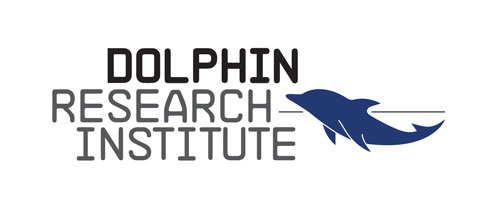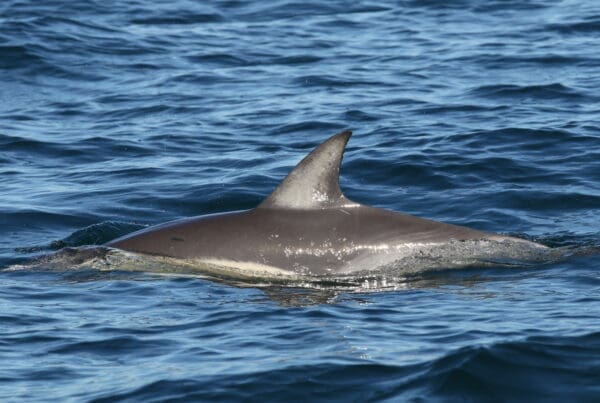In July last year, we made the exciting discovery that V-Nick, one of our common dolphin super-mums, had a new calf – making it her fifth one since she was first seen in Port Phillip 18 years ago.
After spotting the calf again on later surveys, we named it ‘Squiggly’ due to its unusual squiggly spine.
When Squiggly was first seen in July, it actually had a normal, straight spine and appeared to be doing very well as it swam alongside its watchful mum.

However, two months later, we noticed what looked like large lumps on either side of its body. The lumps didn’t seem to affect Squiggly’s swimming ability or behaviour at the time, but in 30 years, we hadn’t seen anything quite like it and were concerned.
We looked for the young calf on future surveys, hoping to get further insight into what was happening.
Luckily on one of our last surveys for 2023, we saw Squiggly again and this time, we were able to see its entire body through the water as it swam up next to the research vessel. That was when we realised Squiggly had scoliosis.

Scoliosis is not uncommon in dolphins, with cases reported in both dolphins and whales worldwide. Squiggly, however, is the first common dolphin with scoliosis that we know of in Port Phillip.
The leading causes of scoliosis in dolphins seem to be through inheritance, disease or as a result of traumatic injury from humans or other dolphins. Some dolphins with this condition are reported to cope well, and some don’t survive.
While Squiggly seemed to be able to keep up with its mum and other dolphins when we last saw it, we believe its condition has worsened since September. We’ll continue our surveys, monitor its progress and keep wildlife managers, and you, informed of what we find.

The story of Squiggly adds another chapter to the lives of Port Phillip’s dolphins. But this is far from being a dolphin ‘Soap Opera’; tracking the success of mothers and calves is a critical part of monitoring the health of their community and the ecosystem they rely on.
We also have concerns about other dolphins: one missing calf that should still be with its mother and one young dolphin covered in skin lesions.
This reinforces that while our dolphins seem to be doing well, we have no room for complacency.
To continue monitoring Squiggly and the rest of its family, we need your support.
Your support of the Future Generations Appeal will not only enable us to continue our surveys, but it will also give us the power to create lasting impact and continue our work in the community developing the next generation of young environmental leaders and scientists.
We aim to raise $20,000 in our Summer Appeal – with $10,000 already committed by a generous donor.
Every gift will take us closer to achieving this goal.






